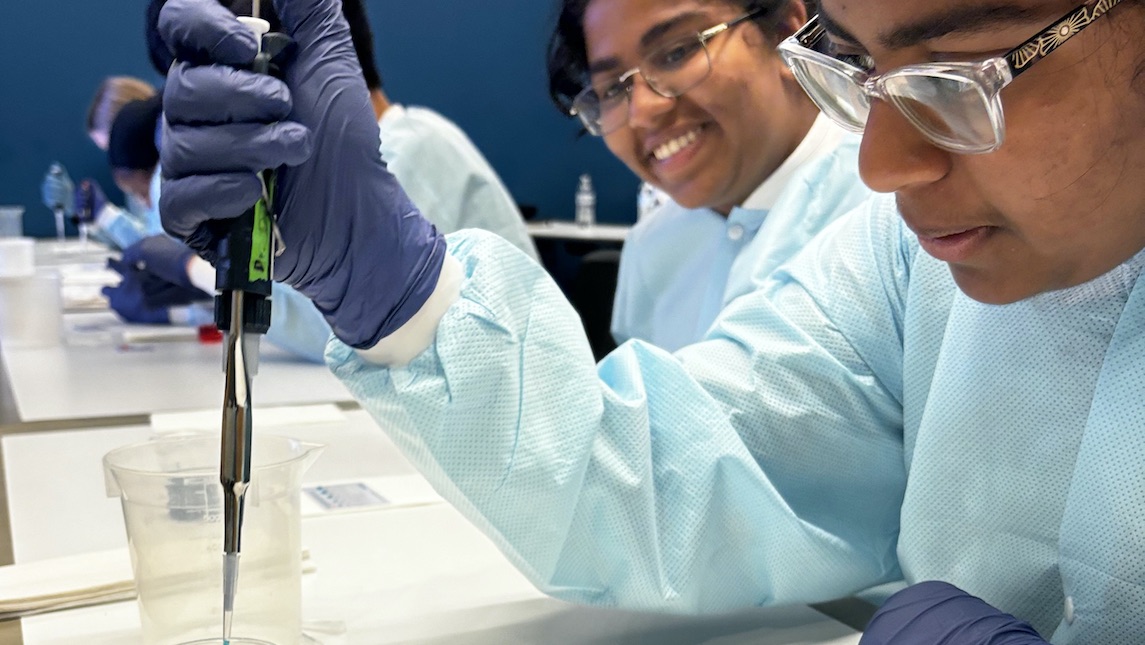For UNC Greensboro’s Daniel Rabinovich, the six-week Draelos Science Scholars program is not just a win-win or even a win-win-win.
“It’s win-win-win-win,” says the Joint School of Nanoscience and Nanoengineering associate dean and professor.
It’s good, he says, for the high school students who take part in the program, the graduate students who work with them day-to-day, the professors who serve as mentors, the University that hosts them, and, in the long run, society in general.
With the goal of inspiring promising students to pursue careers in science, technology, engineering and math (STEM), the scholars program brings local high school students to the UNCG campus each summer to work in university labs alongside graduate students and faculty researchers.
The Power of Mentorship
Twelve JSNN faculty members mentored 18 Draelos scholars in 2024, and another 10 scholars spent time with faculty from UNCG’s departments of Chemistry, Biology, and Kinesiology.
Personally, Rabinovich says he and other faculty members who serve as mentors derive “satisfaction from being able to expose the next generation of young individuals to the process of discovery and to help them understand what fundamental research is and its long-term benefits to society.”
In Rabinovich’s lab, Draelos scholars get to make and characterize new silver-containing compounds (and related species with palladium or platinum) that may have antibacterial and possibly anticancer activity.
Inspiring Young Minds
Rabinovich has served as a Draelos Scholars mentor since 2022, the summer after he joined JSNN. He says that exposing high school students to laboratory research helps the students mature as scientists and gain an appreciation for a wider range of STEM careers than they might otherwise imagine.
“They get really involved in research in the lab, and they are exposed to other areas of research,” Rabinovich says. “The lightbulb moment is when they realize, whether it’s during the summer or after that, what they want to do in college. It’s not what their parents want them to do or what their peers are going to do. They are figuring it out themselves.”
That, he adds, gives them an advantage when it comes to choosing a college and major.
“Students who are not lucky enough to be in a program like this may be undecided when they go to college, but most of the Draelos Scholars go with a career path in mind,” Rabinovich says.
In addition to being valuable to the participants and their faculty mentors, the program also benefits the graduate students who work alongside the scholars each day, he adds.
“Part of graduate education is the experience of mentoring a young mind. That’s useful and important because graduates who have master’s or doctorate degree will always be involved in training, mentoring and supervising in their places of work,” he says.
Finally, Rabinovich sees what he calls “collateral” benefits to the university and to JSNN, a big one being visibility. “It shows the community what we do and the value of what we do,” he says.


Support for the Future of Science
Rabinovich praised JSNN Assistant Professor Kristen Dellinger for coordinating the Draelos Scholars program. He also expressed appreciation for Zoe and Michael Draelos for sponsoring the program since 2016, when it began at High Point University.
The Draeloses, both medical doctors, review hundreds of applications before selecting the scholars, and they also provide support for the Future Science Program, a one-week summer program that JSNN offered for the first time in July. The eight local high school students who participated were introduced to key synthetic biology concepts and techniques, including the use of automatic pipettes, polymerase chain reactions and scanning electron microscopy.
Graduate student Jessica Norcott organized the Future Science Program. Her research centers on the use of problem-based learning to enhance synthetic biology knowledge among high school students and adult learners.
“What the Draeloses are doing through these programs – for the Triad, for the community and for the future of science – it’s huge,” Rabinovich says. “They deserve all my gratitude.”
Story written by Dee Shore, AMBCopy LLC
Photography provided by Joint School of Nanoscience and Nanoengineering



